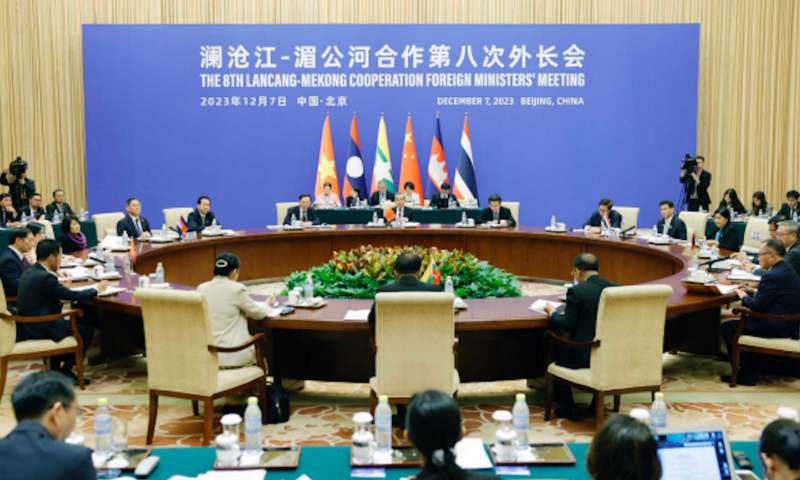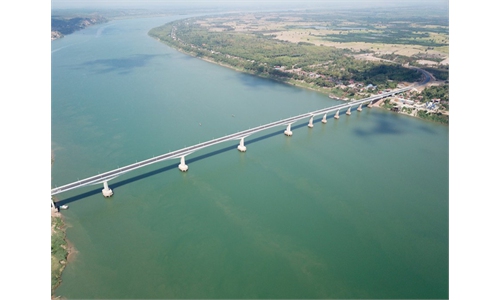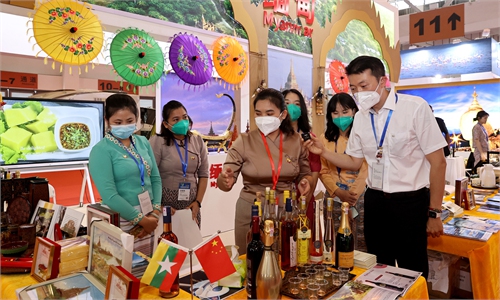
The 8th Lancang-Mekong Cooperation (LMC) Foreign Ministers’ Meeting is held in Beijing on December 7, 2023. Photo: fmprc.gov.cn
The 8th Lancang-Mekong Cooperation (LMC) Foreign Ministers' Meeting was held in Beijing on Thursday. The meeting reviewed the progress of LMC cooperation and outlined key tasks for the next phase, making preparations for the fourth LMC Leaders' Meeting and fostering consensus among the participating nations.
Wang Yi, member of the Political Bureau of the Communist Party of China (CPC) Central Committee and Chinese Foreign Minister, co-chaired the meeting with U Than Swe, Myanmar's Deputy Prime Minister and Union Minister for Foreign Affairs.
According to Wang, since the last Foreign Ministers' Meeting, all the parties have adhered to the LMC philosophy of development first, equal consultation, pragmatism and efficiency, and openness and inclusiveness, having made solid progress in various areas of cooperation, achieved a series of new outcomes and created multiple new highlights.
Advancements have been made in the six priority areas of connectivity, production capacity cooperation, cross-border economy, water resources, agriculture and poverty reduction; mechanisms involving water resources, agriculture, environmental protection, youth exchange cooperation center, and the Global Mekong Research Center have been efficiently operated to provide strong support for deepening cooperation in various fields, said Wang.
Besides, the railways, roads, airports, ports, and networks as well as the hydropower stations, wind power stations, and photovoltaic power stations have become the booster for the economic and trade communications in the region. In 2022, China's annual trade volume with Mekong countries reached $416.7 billion, doubling the amount seven years ago. Cross-border investments by companies from these countries have become more active, injecting power and vitality into local economic development.
The cooperation has continued to improve people's well-being in the six countries and the people-to-people communication, and cooperation has tightened the emotional bond between the people of the six countries.
Wang said China will pursue the principle of amity, sincerity, mutual benefit and inclusiveness to work with Mekong countries to jointly build a Lancang-Mekong community with a shared future, jointly make the region an example for Belt and Road cooperation, a pacesetter for implementing the Global Development Initiative, a pioneer for implementing the Global Security Initiative and a front-runner for implementing the Global Civilization Initiative, Xinhua News Agency reported.
According to Xinhua, Wang suggested that LMC should focus on six areas in the next stage: building a closer community of shared future, creating a more interconnected economic development belt, creating a more secure development environment, moving towards a more digital development prospect, deepening cultural and people-to-people cooperation with more characteristics, and advocating a more inclusive cooperation concept.
In particular, the six countries will prioritize security cooperation in the next phase of collaboration to resolutely crack down on cross-border crimes, especially online scams and gambling, to eliminate security threats that harm the safety of the people and disrupt the development of each country.
The six countries will also engage in diverse and vibrant people-to-people and cultural exchanges in areas such as tourism, sports, media, universities and youth communications, said Wang. China has completed initial preparations for the establishment of the Lancang-Mekong Tourist Cities Cooperation Alliance and supports the creation of the Lancang-Mekong aviation development cooperation alliance, he said.
The ministers from the Lancang-Mekong countries highly praised the positive progress achieved in LMC and agreed that the LMC has become an important platform for maintaining regional peace and stability, promoting regional development and prosperity, and advancing industrialization and modernization of all countries.
All the parties appreciated China's positive contributions to promoting the LMC and agreed with China's proposals on the direction of work in the next stage.
They agreed to strengthen unity, enhance cooperation, adhere to mutual trust and respect, strengthen the building of the Lancang-Mekong economic development belt, deepen cooperation in priority areas, unleash development potential, jointly address global challenges, and work together to build a closer Lancang-Mekong community with a shared future.


